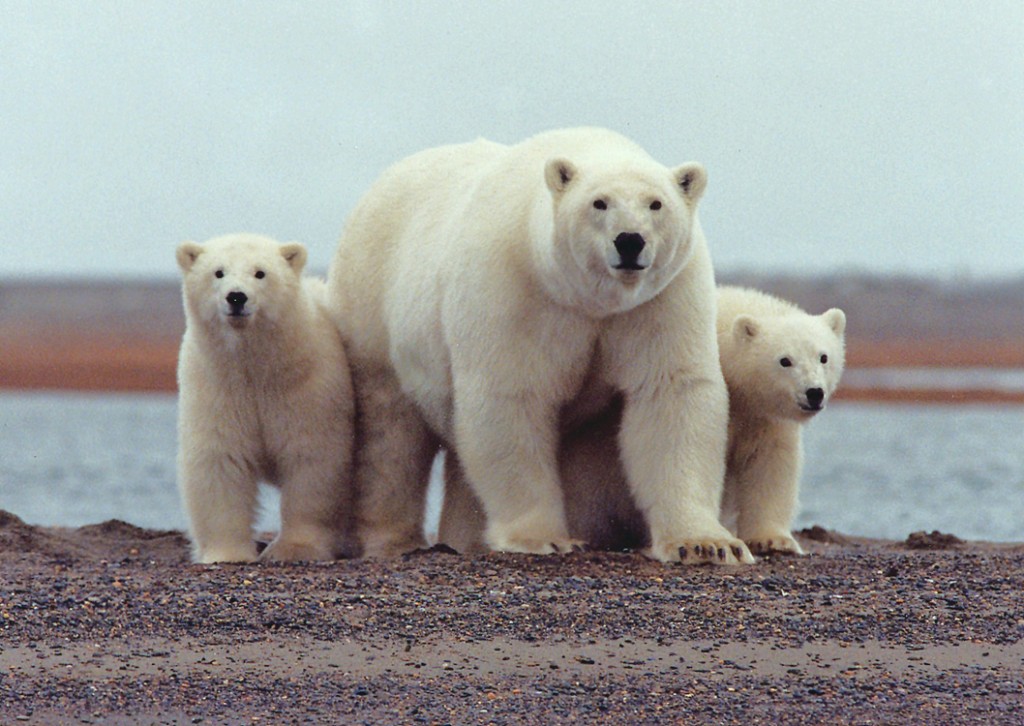Obama administration expected to approve Shell’s Arctic drilling program as early as Wednesday
Written by Lauren McCauley, staff writer for CommonDreams, published March 24, 2015

A polar bear keeps close to her young along the Beaufort Sea coast in Arctic National Wildlife Refuge. (Susanne Miller/USFWS) Image via Wikimedia.
Marking 26 years since the Exxon Valdez ran aground spilling as much as 38 million gallons of oil into the Port William Sound in Alaska, activists on Tuesday protested the Obama administration’s continued support for Arctic oil exploration.
Despite the known threat to the fragile Arctic ecosystem and high risk of a devastating oil spill, the Department of the Interior is expected as early as Wednesday to sign off on the revised environmental impact statement (EIS) for Shell’s Chuckchi Sea lease, which would clear a major hurdle for the company to restart its Arctic drilling program this summer.
Interior Secretary Sally Jewel’s formal announcement will follow last month’s approval by the Bureau of Ocean Energy Management (BOEM), which was given despite the agency’s own EIS finding that “there is a 75% chance of one or more large spills” occurring.
The Chukchi Sea, one of the world’s great and unspoiled ocean ecosystems, is home to an estimated 2,000 polar bears and is the feeding ground for migratory gray whales.
On Tuesday, protesters displayed pictures outside the White House gate of the devastation caused by the 1989 spill and held signs that read: “If Shell drills in the Arctic, 75% chance of an oil spill, 100% chance of climate disruption. It’s not worth the risk.”
Greenpeace, which organized the protest along with Alaska Wilderness League, Sierra Club, and Friends of the Earth, has also dispatched its ship, the Esperenza, to tail Shell’s drilling fleet as it makes its way across the Pacific.
Meanwhile, in Seattle, environmental groups won a preliminary legal victory on Friday after a judge approved their standing to challenge Shell’s plan to lease a port terminal to serve as a “homeport” for its drilling fleet. Seattle’s approval of the plan, the groups charge, was given without public notification or consent.
On Monday, all nine members of the Seattle City Council signed a letter calling on Jewell to block the drilling program, McClatchy reports.
“We are deeply concerned about increased leasing and drilling in the Arctic Ocean,” the letter stated. “There is no proven way to recover spilled oil effectively in the harsh conditions prevalent in the Arctic.”
“Any oil company that says that it can drill safely in the harsh and demanding Arctic environment is putting the entire region in jeopardy.”
—Eric Larsen, Arctic explorer
The council members also said they are concerned about the “impacts of readying Shell’s ships at the Port of Seattle on the water quality of Puget Sound.”
On Sunday, Arctic explorer Eric Larsen published an op-ed Seattle’s newsweekly The Stranger warning against the dangers of Arctic drilling and the city’s decision to permit Shell the use of its terminal.
“Drilling in the Arctic Ocean will not only continue the destruction of this unique environment but also contribute to the plague of human-caused climate change already affecting the entire planet,” Larsen wrote.
He continued:
While there have been some positive moves, such as the Obama administration’s action to safeguard some areas of the Arctic Ocean, there have also been others that threaten to further worsen the problem—the Port of Seattle’s decision to open its doors to Shell’s Arctic drilling fleet, and the Obama administration’s continued consideration of drilling in other parts of the Arctic Ocean among them.
Preparing for my expeditions takes years of planning, training and testing gear. To rush any facet spells injury or worse for me and my team. Rushing Arctic drilling through the Chukchi lease sale is even more risky. And doing so to satisfy one oil company eager to drill is not worth the potential damage to our climate, our environment, and local communities.
After suffering countless expedition gear failures, I know that the Arctic is one of most inhospitable regions on the planet. Any oil company that says that it can drill safely in the harsh and demanding Arctic environment is putting the entire region in jeopardy.
In 2013, Shell was forced to suspend its Arctic drilling program after the grounding of its Alaskan Arctic drilling rig, the Kulluk. Related safety violations stalled drilling the following two years.
This work is licensed under a Creative Commons Attribution-Share Alike 3.0 License

